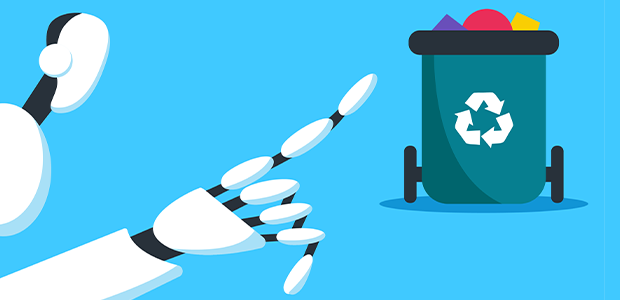
From chaos to clarity: how AI is cleaning up recycling confusion
Every day, recyclable materials that could be recycled are thrown into general waste bins, destined for landfills or incineration. In the UK alone, over half of households admit to doing this. And even when items do make it into recycling bins, 80% of them are “wishcycled” – put there with hope, rather than certainty, about whether they belong.
Recycling is excellent in promise, as research shows that it has the potential to cut carbon emissions by 700 million tonnes per year. Yet, when not executed correctly, it becomes a problem for us to solve.
This recycling confusion isn’t entirely on the onus of the consumer. Modern packaging has become more complex, combining multiple materials into single products. On top of that, local recycling rules differ wildly and packaging symbols can be confusing, making it hard for people to keep up. With so much room for error, how can we possibly get it right? That’s where AI technology comes in.
How AI can turn confusion into confidence
The Bower app, powered by AI, takes all the guesswork out of sorting your waste. Imagine this: you’re holding an empty jar of peanut butter, unsure of where to throw it. With Bower, all you need to do is point your phone’s camera at the jar, and voila – clear, accurate instructions on how and where to recycle it appear instantly.
This transformative solution is made possible by cutting-edge AI technology. Using Google’s DeepMind Gemini models alongside our own trained open-source computer vision system, the app identifies items based on image recognition, even those without barcodes or associated data. Through this process, AI can predict the material type and provide precise sorting instructions, eliminating confusion and significantly increasing the volume and quality of correctly sorted materials.
This technology doesn’t just guide consumers; it also connects industries and communities. Through our open-source data model, companies can build on these AI capabilities to expand their own solutions; for example, enabling textile repair or managing electronic waste. This collaborative approach strengthens the circular ecosystem, linking waste management players, industries, and citizens to a common goal.
Looking ahead, this technology has the potential to significantly enhance traditional methods of waste management. By analysing behavioural data (what and where users are actually sorting), we can provide accurate, real-time sorting instructions that bypass outdated and often incorrect on-pack recycling labels and reduce reliance on manual updates from local authorities. This innovation will make it faster and easier for consumers to follow the correct recycling practices, enabling us to scale our app across diverse markets with fragmented waste systems and better connect people to existing infrastructure.
Rewards that make a difference
Even with the best of intentions, and the most advanced AI technology, a little nudge goes a long way. That’s why Bower rewards users for each item they recycle correctly, in the form of in-app ‘XP’ or coins with our connected brands. Turning good habits into tangible rewards - like coupons, money transfers or charitable donations – makes recycling more exciting and actively encourages people to recycle better and ensure waste is sorted accurately.
Our community has already proven this works. Across the Nordics, the UK, and beyond, over 700,000 users have sorted more than 134 million packages through Bower. In fact, nearly a third of those items wouldn’t have been sorted without the app’s guidance, which is a testament to how technology can teach consumers to sort waste correctly.
Partnering for a greener future
Of course, recycling isn’t something individuals can tackle alone. Businesses have a huge role to play, which is why Bower has partnered with more than 500 brands, including Nespresso, Gillette, and Unilever. Through our technology, brands can better understand how their products are being disposed of, encourage more responsible recycling behaviour, and make progress toward their sustainability goals.
Take Nespresso, for example. Since partnering with us, we’ve helped our users recycle more than 3.3 million of their coffee capsules. Beyond the environmental impact, this partnership has created a loyal community of eco-conscious consumers, proving that sustainability and business success can go hand in hand. Coffee pods can also be complicated to sort correctly, which is where AI and our barcodeless scanning technology come in handy.
This seamless blend of technology and user-friendly solutions can both simplify recycling and inspire a shift in how we view and manage waste in our daily lives. The next time you’re unsure about where to throw that peanut butter jar, let AI take the lead. If we leverage recycling technology in the right way, confusion turns into clarity, and waste transforms into value. Every scan, every correctly sorted item, and every small everyday action contributes to a smarter, more sustainable future: one where innovation enables us to make choices that benefit our planet.
For more startup news, check out the other articles on the website, and subscribe to the magazine for free. Listen to The Cereal Entrepreneur podcast for more interviews with entrepreneurs and big-hitters in the startup ecosystem.

